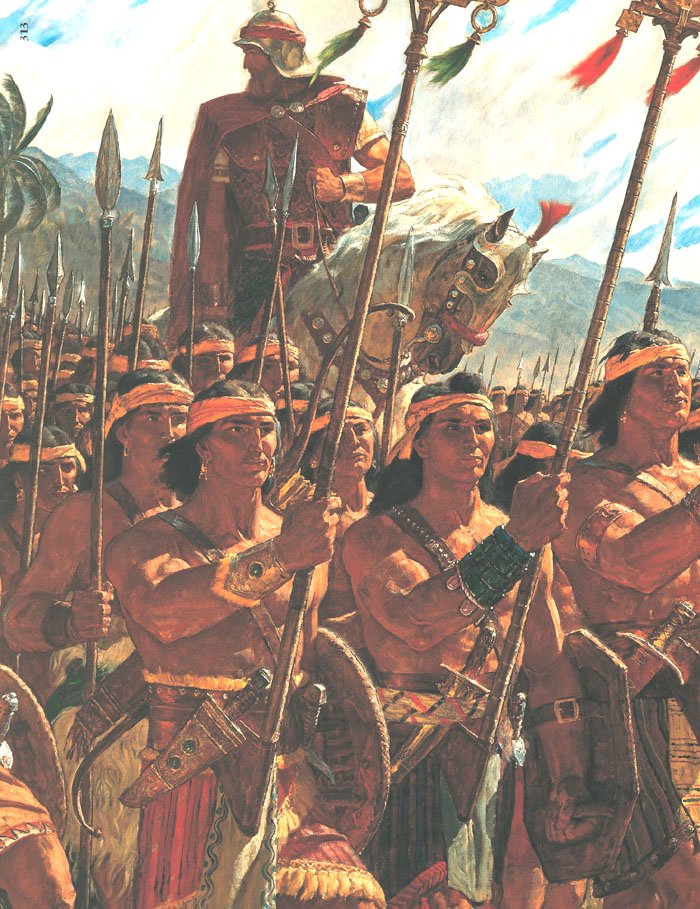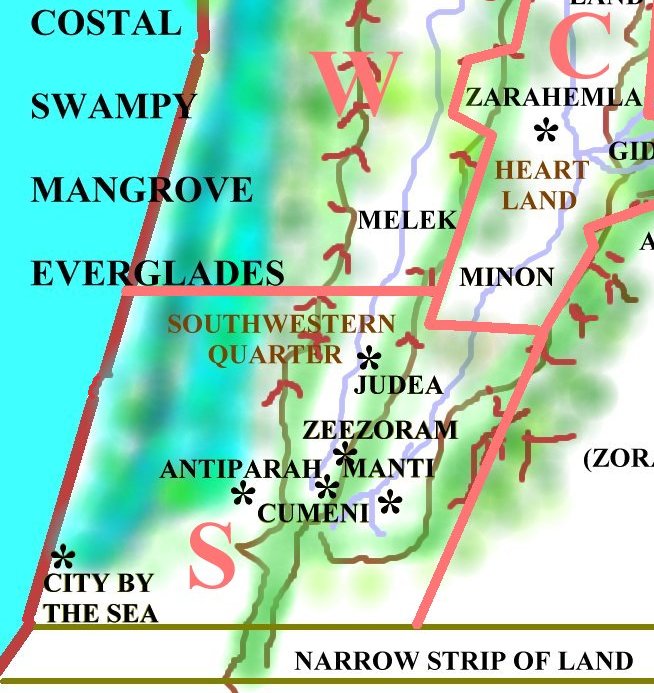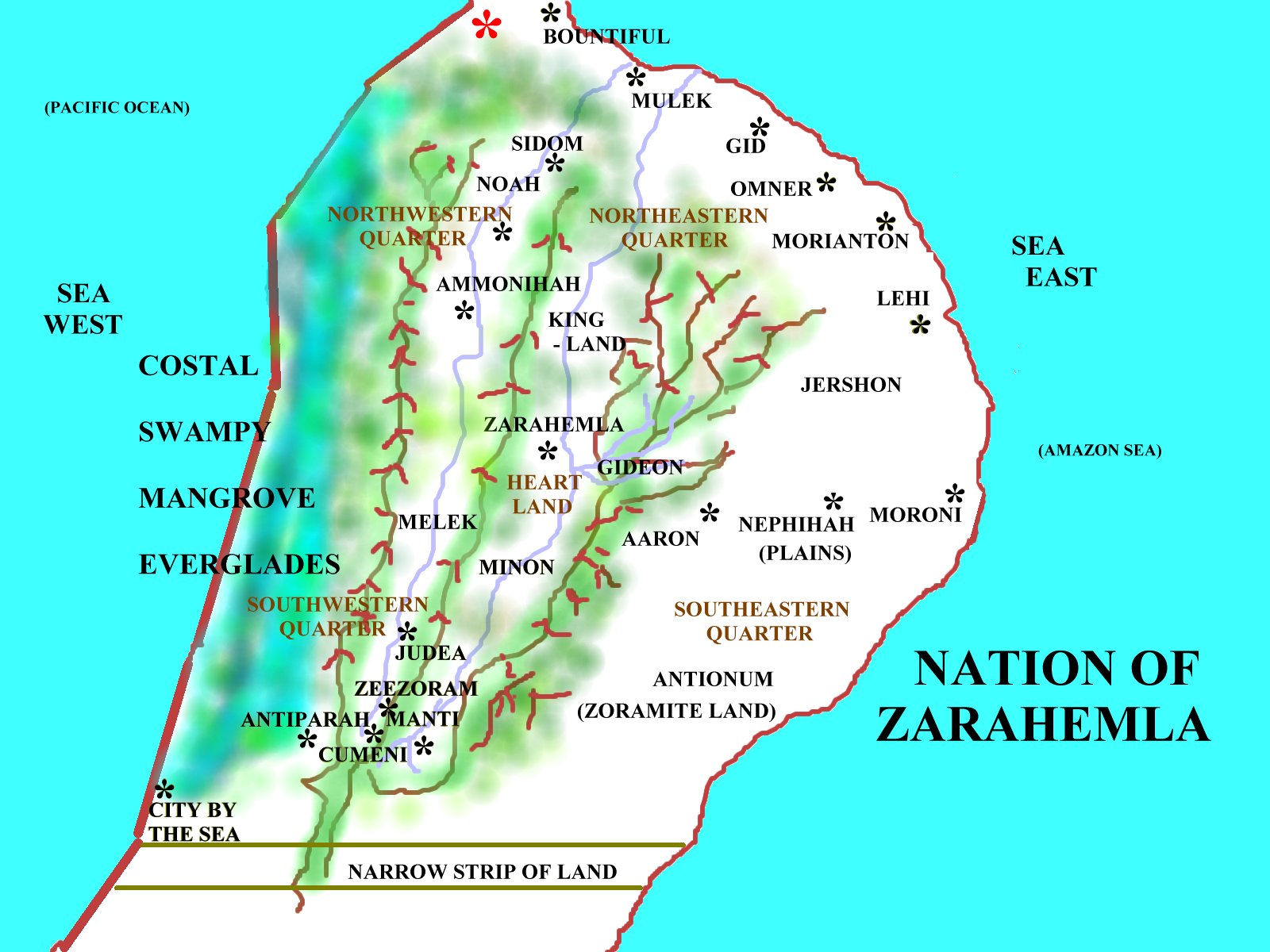|
|
|
|
 CHAPTER 53
CHAPTER 53
The Lamanite prisoners are used to fortify the city
Bountiful— |
||
|
1 AND it came to pass that they did set
guards over the prisoners of the Lamanites, and did compel them to go
forth and bury their dead, yea, and also the dead of the Nephites who were
slaina; and Moroni placed men over
them to guard them while they should perform their labors.
2 And aMoroni went to the city of Mulek with Lehi, and took command of the city and gave it unto Lehi. Now behold, this Lehi was a man who had been with Moroni in the more part of all his battles; and he was a man like unto Moroni, and they rejoiced in each other's safety; yea, they were beloved by each other, and also beloved by all the people of Nephi. 3 And it came to pass that after the Lamanites had finished burying their dead and also the dead of the Nephites, they were marched back into the land Bountiful; and Teancum, by the orders of Moroni, caused that they should commence laboring in adigging a ditch round about the land, or the city, bBountiful.
|
1a did compel them to go forth and bury their dead, yea, and also the dead of the Nephites who were slain Now just how far inland the plains between Bountiful and Mulek were is not so stated in the Book of Mormon. Here to fore and even since when battles occured near bodies of water, either the river Sidon or the sea itself in the later case of the city of Teancum, the bodies of the enemy were merely cast into the water and carried out to sea, Thus the plains upon which the battle took place must be considered to be some amount of miles inland from the sea shore to the extent that it was easier to bury the bodies than to carry them to the sea to be cast in there. |
2a
Alma 48:17 3a Alma 52:6 b Alma 52:9 (9, 17, 27); Alma 63:5
|
|
4 And he caused that they should build a breastwork of timbers
upon the inner bank of the ditch; and they cast up dirt out of
the ditch against the breastwork of timbers; and thus they did
cause the Lamanites to labor until they had encircled the city of
Bountiful round about with a strong wall of timbers and earth, to
an exceeding heighta.
5 And this city became an exceeding stronghold ever after; and in this city they did guard the prisoners of the Lamanites; yea, even within a wall which they had caused them to abuild with their own hands. Now Moroni was compelled to cause the Lamanites to labor, because it was easy to guard them while at their labor; and he desired all his forces when he should make an attack upon the Lamanites.
|
4a a strong wall of timbers and earth, to an exceeding height The primary building material of the land of Zarahemla was timber. The Nehpites of the land of Zarahemla became expert in building with timber, their buildings and sanctuaries were so constructed. And later it will be when the Nephites go forth to inhabit the land north, they will establish a great shipping industry to ship timber to the land north that they might still construct much of their cities out of timber, though they do begin to also build much with stone and cement upon the land northward. Zarahemla was mostly a forested wilderness, a rain forest of great stands of timber where as the land northward had been swept clean of its timber by the scorched earth policy of Shiz in sweeping the land clean before him as he pursued the armies of Coriantumr. Thus considering that the city of Bountiful was so constructed after the manner of the Nephites of Zarahemla, building primarily of timber and even in construction of their city walls there is only the metion of earth and not rock or stone; one must wonder concerning the artistic accuracy of the portrayal of Christ's appearance to the Lamanites with great stone structures rather than timber structures in the background. |
4a
Alma 50:2-3 5a Alma 55:25-26
|
|
6 And it came to pass that Moroni had thus gained a victory over one
of the greatest of the armies of the Lamanites, and had obtained possession
of the city of aMulek, which was one of the strongest
holds of the Lamanites in the land of
Nephia; and thus he had also built a
stronghold to retain his prisoners.
7 And it came to pass that he did no more attempt a battle with the Lamanites in that year, but he did employ his men in preparing for war, yea, and in making fortifications to guard against the Lamanites, yea, and also delivering their women and their children from famine and affliction, and providing food for their armies.
|
6a the city of Mulek, which was one of the strongest holds of the Lamanites in the land of Nephi (Note: This is the second noticed error of Mormon in the engraving of the Book of Mormon, see Alma 51:26 for the first.) As it states upon the title page of the Book of Mormon writen by Moroni or Mormon, '... if there are faults they are the mistakes of men; wherefore, condemn not the things of God ...'. Also stated by Moroni in Mormon 8:12, ' ... whosoever receiveth this record, and shall not condemn it because of the imperfections which are in it, the same shall know of greater things than these.' Now the Book of Mormon does not represent itself to be perfect but to have error of men in it. Perhaps this is one of those errors when Mormon's abridgment makes Mulek a city of the land of Nephi, which land of Nephi was south of the land of Zarahemla and not near to the narrow neck of land as was Mulek. Whether this momentary slip of engraving the name of Nephi rather than that of Zarahemla was even recognized by Mormon that he had made an error, or even if it was an error in Joseph Smith's translation, it is but the error of a man and not of God. And while the Bible is full of such errors, men to jump to condemn the Book of Mormon because of it? Now if it is not an error then there are two possible answers. 1), perhaps the nation of Zarahemla did have one of its own lands called by the name of Nephi also and Mulek was one of the cities in it. Or 2), when the Lamanites had captured the cities from the Nephites they began calling them to be a part of the land of Nephi. In either case, error or not, one is not to comdemn this record containing such great things of God for such mere imperfections of men. |
6a
Alma 51:26;
Alma 52:22
|
|
8 And now it came to pass that the armies of the Lamanites, on
the west sea, southa, while in the
absence of Moroni on account of some intrigue amongst the Nephites, which
caused adissensions amongst
them, had gained some ground over the Nephites, yea, insomuch that they had
obtained possession of a number of their cities in that part of the land.
9 And thus because of ainiquity amongst themselves, yea, because of dissensions and intrigue among themselves they were placed in the most dangerous circumstances.
|
8a on the west sea, south Here again we have a reference to the land where the Lamanites have come upon the Nephites on the south border which when taken in the broad picture does suggest a skewing of the land to the west in the upper regions of the Sidon River from Manti west. This correlates well with the southern reaches of the three cordillera ranges of Colombian where they come together to the west into one Andean range on down through the rest of the land. |
8a
Alma 31:8;
Hel. 1:15 9a Josh. 7:4
|
|
10 And now behold, I have somewhat to say concerning the
apeople of Ammon, who in the beginning, were Lamanites; but
by Ammon and his brethren, or rather by the power and word of God, they had
been bconverted unto the Lord; and they had been brought
down into the land of Zarahemla, and had ever since been protected by the
Nephites.
11 And because of their oath they had been kept from taking up arms against their brethren; for they had taken an oath that they anever would shed blood more; and according to their oath they would have perished; yea, they would have suffered themselves to have fallen into the hands of their brethren, had it not been for the pity and the exceeding love which Ammon and his brethren had had for them. 12 And for this cause they were brought down into the land of Zarahemla; and they ever had been aprotected by the Nephites.
|
10a
Alma 27:26 b Alma 23:8-13 11a Alma 24:18 (17-19) 12a Alma 27:23
|
|
|
13 But it came to pass that when they saw the danger, and the
many aafflictions and tribulations which the Nephites bore
for thema, they were moved with
compassion and were bdesirous to take up arms in the
defence of their country.
14 But behold, as they were about to take their weapons of war, they were overpowered by the persuasions of Helaman and his brethren, for they were about to abreak the boath which they had made. 15 And Helaman feared lest by so doing they should lose their souls; therefore all those who had entered into this covenant were compelled to behold their brethren wade through their afflictions, in their dangerous circumstances at this time.
|
13a when they saw the danger, and the many afflictions and tribulations which the Nephites bore for them Being now in the land of Melek, the Lamanite and Nephite wars which were proceeding just to their south in the southwest quarter of the land certainly would not go unnoticed. The danger was immediate, especially when the defensive cities began to fall and perhaps only such as the city of Judea remaining as one of the last strongholds before the Lamanite invasion would arrive in their own lands of Melek. And they would certainly have seen the Nephite forces coming and going, marching through their land as was the likely course of Moroni when he departed the southwester quarter to march to the aid of Teancum in the northeast quarter about Mulek and Bountiful. |
13a
TG
Affliction;
TG
Tribulation b Alma 24:18 (17-19); Alma 56:7 14a Num. 30:2 b TG Oath
|
|
16 But behold, it came to pass they had many asons,
who had not entered into a covenant that they would not take their weapons of
war to defend themselves against their enemies; therefore they did assemble
themselves together at this time, as many as were able to take up arms, and
they called themselves Nephitesa.
17 And they entered into a covenant to fight for the liberty of the Nephites, yea, to protect the land unto the alaying down of their lives; yea, even they covenanted that they never would give up their bliberty, but they would fight in all cases to protect the Nephites and themselves from bondage.
|
16a they called themselves Nephites Though these Sons of the Lamanites were not descended by blood from Nephi, in respect to the fact that it was the teachings of Nephi of the Christ to which they were converted and did live, they did consider themselves to be after the order of Nephi and therefore Nephites. And for assuredly so they were. |
16a
Alma 57:6 17a TG Self-sacrifice b Alma 56:47; TG Liberty
|
|
18 Now behold, there were two thousand of those young men, who
entered into this covenant and took their weapons of war to
defend their country.
19 And now behold, as they never had hitherto been a disadvantage to the Nephites, they became now at this period of time also a great support; for they took their weapons of war, and they would that Helaman should be their leader. 
|
20a
TG
Courage;
TG
Dependability; TG Integrity
|
|
|
21 Yea, they were men of truth and asoberness, for
they had been taught to keep the commandments of God and to
bwalk uprightly before him.
22 And now it came to pass that Helaman did march at the head of his atwo thousand stripling soldiers, to the support of the people in the borders of the land on the south by the west seaa. 23 And thus ended the twenty and eighth year of the reign of the judges over the people of Nephi.
 |
22a in the borders of the land on the south by the west sea Again this type of description of the land of the southern border suggests a skewing of the land to the west, the from Manti west, all those cities including Manti were to the west and nearer the west sea than the east sea. Thus we look to Manti being much nearer the west sea than the east sea due to this skewed descriptive phrasology. |
21a
TG
Sobriety b TG Walking with God 22a Alma 56:3 (1-9)
|
 |
||
| This BM Book | Previous BM Chapter | Next BM Chapter | Commentary Page | Home Page |